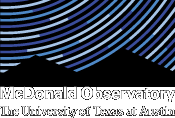Tom Barnes Celebrates Six Months as Superintendent of McDonald Observatory
13 September 2010
FORT DAVIS, Texas — As Tom Barnes celebrates six months as Superintendent of The University of Texas at Austin McDonald Observatory in September, he lays out several goals for the Observatory.
Barnes, an astronomer who specializes in studying variable stars, took over permanent management of the West Texas site in March after serving as Interim Superintendent for four months. His 40-year history with McDonald includes 21 years as its chief operating officer, based in Austin.
"I supervised the Superintendent for a couple of decades," he says, "so I know the issues from the Austin end. Now I'm learning them from the West Texas end."
Barnes says his goals include community involvement in West Texas, and internally, a focus on improving communications between McDonald Observatory and Austin and on an understanding of University of Texas regulations.
"I want to make sure that McDonald engages well with the local area," Barnes says. It's a reciprocal relationship, he says. The community has been good to the Observatory for many decades.
"This is something that past superintendents have done well. The Observatory and its residents participate in many things locally, for example, some of our employees have been elected to local office in Jeff Davis, Presidio, and Brewster Counties." The Observatory also provides free admission to programs for residents of Fort Davis, Marfa, and Alpine.
One of the main things the community has done for McDonald has been to support light-pollution controls. "We are the darkest professional observatory in the continental United States ... in large measure due to low population and the cooperation of our neighbors in keeping lighting on the ground and not in the sky.
"Light control made possible things like the Hobby-Eberly Telescope," he says, specifying that without this cooperation from the community, the HET consortium might not have chosen McDonald for the giant telescope's home.
Thanks to help from the community, he adds, "we're in great shape relative to other U.S. observatories, with respect to maintaining the quality of our site into the future, and being able to develop our site. We're still attracting telescopes ... both professional and for the Visitors Center." He adds that the Observatory is in talks with several groups to bring more telescopes to McDonald.
Barnes is also tackling new rules and regulations that UT-Austin has instituted. He explains that the changes affect security, purchasing, and a stricter application of University policies on the remote McDonald campus than has historically been the case.
"The fact that UT is now requiring us to implement [certain] policies here has proven to be very hard for the Observatory to deal with," he says. "This has caused a lot of confusion. I want to help the Observatory work within a new framework that has not been our natural way of looking at things.
"There is a new emphasis on McDonald obeying campus rules, and some of it bleeds over in a way that affects the community," he adds. For example, "the Observatory is working closely with the county to allow us to be of assistance in firefighting, both at the Observatory and off, in a way that falls in line with the [University's] rules." To that end, McDonald is currently working on a Memorandum of Understanding with Jeff Davis County.
Finally, Barnes says he is working to improve communications between the Observatory and its parent campus in Austin. "We are a sub-campus of UT-Austin," he says. "That leads to a lot of communication issues. I will continue to work hard to get that communication on a solid foundation."
Barnes received his Ph.D. in 1970 from the University of Toronto. He came to The University of Texas at Austin later that year as the W.J. McDonald Fellow in astronomy, and has held many positions subsequently. In the early 1990s, he led planning for the staffing, budgeting, and operation of the HET, and later served as its Commissioning Manager.
More recently, Barnes took a leave of absence from McDonald to serve as a Program Manager at the National Science Foundation, where from 2006 to 2009 he was responsible for the management of the National Optical Astronomy Observatory and the National Solar Observatory.
Barnes has served by election on the governing commission for variable star research of the International Astronomical Union. He also served as a peer reviewer on the first panel to evaluate proposals to use the Hubble Space Telescope. He has served on review panels for various national agencies including the National Science Foundation and NASA. Since 1991, he has been Technical Editor for McDonald Observatory's nationally syndicated StarDate radio program and StarDate magazine.
Established in 1932, The University of Texas at Austin McDonald Observatory near Fort Davis, Texas, hosts multiple telescopes undertaking a wide range of astronomical research under the darkest night skies of any professional observatory in the continental United States. McDonald is home to the consortium-run Hobby-Eberly Telescope, one of the world's largest, which will soon be upgraded to begin the HET Dark Energy Experiment. An internationally known leader in astronomy education and outreach, McDonald Observatory is also pioneering the next generation of astronomical research as a founding partner of the Giant Magellan Telescope.
— END —
Contact:
Dr. Tom Barnes, Superintendent, McDonald Observatory: 432-426-3633
Rebecca Johnson, Press Officer, McDonald Observatory: 512-475-6763





